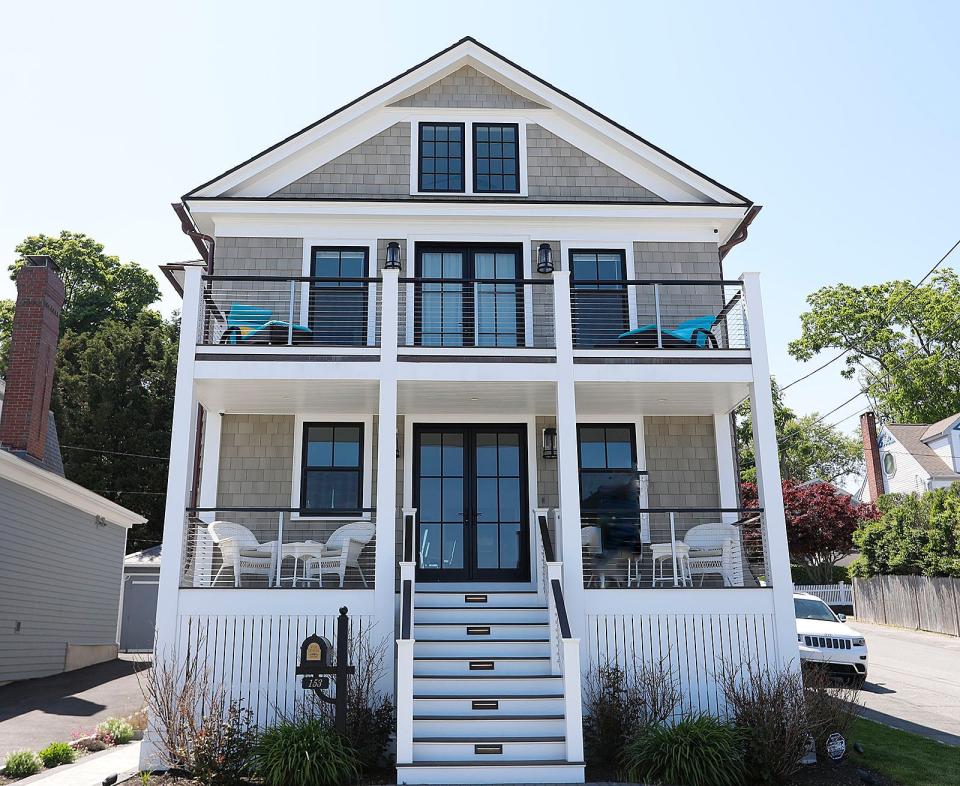'Stop advertising, renting and accepting reservations,' judge tells Quincy Airbnb owner
QUINCY – A Dedham Superior Court judge has granted Quincy’s request for a preliminary injunction against Squantum resident Ronen Zangi, restraining him from short-term rentals at his 153 Bayside Road property pending a final ruling in the city's case against him.
Quincy sued Zangi on May 17, asking the court to enforce its prohibition against short-term rentals in residential neighborhoods and assess monetary penalties for Zangi's alleged violations.
In its complaint, the city said it documented 41 separate guest stays at 153 Bayside Road between February 2021 and February 2022.
A week after hearing arguments from both sides June 28, Superior Court Judge Mark A. Hallal ordered Zangi on Thursday to stop advertising, renting and accepting reservations for future short-term rentals.

Quincy City Solicitor Jim Timmins said the order means that use of the property as an Airbnb has to stop immediately and remain discontinued until the case is tried and decided on its merits.
Timmins said Zangi could appeal the order. Unlike an appeal of a final judgment, an appeal on a preliminary order, called an interlocutory appeal, is assigned to a single judge rather than a panel of appellate judges and is processed on a more expedited timeline, Timmins said.
Zangi’s lawyer, John Bowen, could not be reached to comment on a potential appeal.
Double-murder trial: Jurors deciding the fate of Emanuel Lopes told to keep deliberating: What to know
As of Friday, June 7, Zangi’s property is booked solid up to Sept. 16 on Airbnb.com. As of that date, a notice sets the minimum duration of stay at 31 days for new reservations. Quincy’s zoning ordinance defines a short-term rental as 30 days or less.
In an email to The Patriot Ledger, Quincy Assistant Solicitor Janet Petkun wrote that "the city will monitor the property to make sure that Mr. Zangi is abiding by the court's order."
At the June 28 hearing, Bowen argued that Quincy must prove “irreparable harm” resulting from Zangi’s short-term rentals to obtain injunctive relief before the court issues a final decision.
Summer fun in Quincy: How many Quincy beaches can you name? Here's a brief guide to them all
Hallal asked Bowen why continued short-term rentals in the Squantum neighborhood should not constitute irreparable harm. Bowen acknowledged that the city alleges complaints from neighbors, but he said the city hasn’t presented affidavits or specific evidence to the court “touching upon immediate and irreparable harms.”
At the hearing, Quincy Assistant Solicitor Janet Petkun argued that while Zangi’s short-term rental operation has caused and continues to cause irreparable harm to the neighborhood, the city does not need to meet that standard to obtain the injunction. She said that in cases where government officials seek a preliminary injunction to enforce laws, they only need to show the likelihood of success in court and that the requested order promotes the public interest.
“Since Mr. Zangi began his operation, the neighborhood has faced extraordinary disruption from tenants who have no substantial connection to the neighborhood – and conducted themselves accordingly,” Petkun wrote in a court filing in support of the city’s petition for the injunction.
A neighbor said her husband died of a heart attack after confronting renters of Zangi’s home during a loud party last Labor Day weekend.
Theresa Repoff, of 24 Orchard St., said her 72-year-old husband, Bill, suffered a fatal heart attack after an altercation with guests at Zangi's house who were shooting off fireworks into the neighborhood. Repoff said she heard people swearing at her husband as he returned home, and that someone threw a beer at him.
Should schools ban students' cellphones? South Shore educators weigh in
Quincy has sued another short-term-rental operator, Zheng Liao, of 33-35 High St., and seeks a preliminary injunction in this case as well.
In its complaint, the city says Liao is violating a city ordinance by renting to short-term tenants for about $50 a night within a residential neighborhood. The city says it began receiving complaints from neighbors in July 2022 and that the homeowner “simply ignores” orders to stop.
In opposing the city’s motion for a preliminary injunction, Liao’s lawyer, David Glod, wrote that Liao and her husband have used the property for short-term rentals since 2016, years before the Quincy City Council enacted restrictions in March 2021. Glod wrote that the rentals are a “preexisting nonconforming” use, which he says are exempted under Quincy’s zoning ordinance.
Glod also wrote that the city cannot show irreparable harm.
Timmins said the city temporarily paused litigation against Liao to move ahead with the Zangi case. He said the city is still gathering information on the Liao case and expects to move forward soon.
Thanks to our subscribers, who help make this coverage possible. If you are not a subscriber, please consider supporting quality local journalism with a Patriot Ledger subscription. Here is our latest offer.
Reach Peter Blandino at pblandino@patriotledger.com.
This article originally appeared on The Patriot Ledger: Bayside Road Airbnb owner must stop renting; judge sides with Quincy

